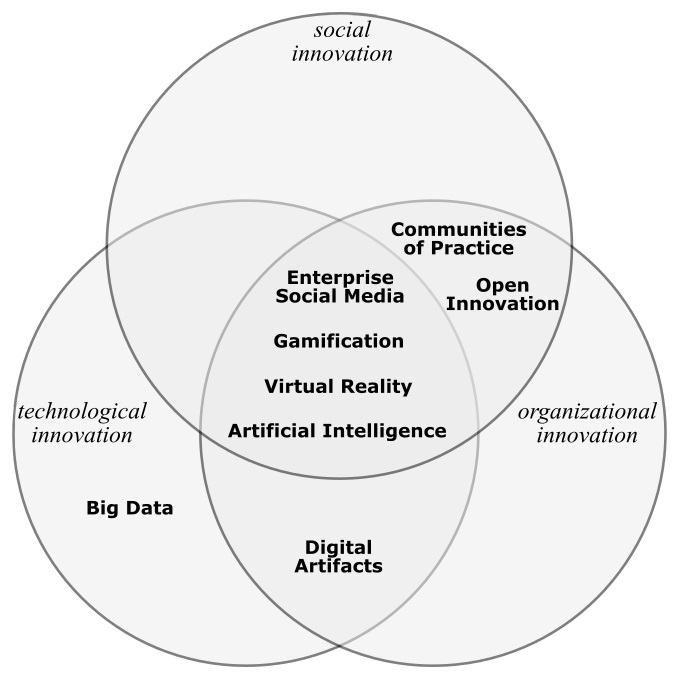
Emerging innovative concepts in knowledge management
As highlighted by the intensity of recent discussion in online forums, artificial intelligence (AI) is an emerging innovation which is likely to significantly impact on knowledge management (KM). Other emerging innovations such as big data and gamification have also been receiving considerable attention within the KM community.
However, there are other emerging innovative concepts that should also be an important focus for KM practitioners, but these are not yet receiving the attention they deserve. These concepts can be seen in a paper1 presented by Johannes Schenk at the recent 56th Hawaii International Conference on System Sciences. This gap between research findings and practice reinforces the need for KM practitioners to use research evidence in their work.
In his paper, Schenk documents the findings of a systematic review of relevant research literature. From a database search and screening, 37 relevant articles dealing specifically with innovation within the discipline of KM were identified, consisting of 26 journal articles, 10 conference papers, and a book.
Eight innovative concepts in KM
Analysis of the 37 relevant articles revealed eight reoccurring innovative concepts within the discipline of KM. Schenk defines “reoccurring” as being where an innovative concept was found in multiple (at least three different) articles. The concepts vary in their scope and level, from applied methods to comprehensive models.
As shown in Figure 1, Schenk then categorized the eight concepts into a VENN diagram, based on the following KM innovation categories:
- technological KM innovations – these deal with information and communications technology (ICT) in KM systems (e.g. intranet platforms for storing information)
- social KM innovations – these involve the human factor and the interplay between individuals (e.g. motivation incentives for knowledge sharing)
- organizational KM innovations – relate to structure and hierarchy (e.g. breaking up knowledge silos through interdisciplinary knowledge exchange groups).

The often-discussed concepts of AI, big data, and gamification are among the eight. However, so too are the concepts of open innovation, digital artifacts, and virtual reality, but these are much less discussed in KM communities. That these concepts are receiving much less attention from KM practitioners is a significant concern.
For example, as highlighted in previous RealKM Magazine articles, the additional external perspectives that open innovation brings to decision-making2 can lead to much better organizational outcomes than the inward-looking focus of dangerously flawed first generation KM programs, such as those of Boeing and Toyota.
Furthermore, while another of the eight concepts, Communities of Practice (CoPs), has been long-established as important aspect of KM, the emerging concepts research reviewed by Schenk shows that CoPs have great relevance to open innovation, as discussed below. The open innovation case study of Xiaomi linked from the paragraph above is a clear example of how CoPs can function as open innovation intermediaries between organizations and their wider online communities.
The reviewed research also shows that while AI is often talked about as having considerable potential in KM, there are so far very few tangible initiatives in this regard, as discussed below.
Findings from the reviewed research
The findings from the reviewed research in regard to each of the eight reoccurring innovative concepts in KM is summarized as follows:
- Artificial intelligence (AI) is a range of computational innovations that uses human-like intelligence to answer more complicated decision-making issues. Current research considers AI to be able to transform and fundamentally change knowledge processes in our working environments, society and economy. However, most of the reviewed articles regarding AI are of conceptual nature, with just one study being quantitative. Schenk advises that this conceptual focus shows that there is still plenty of room for applied research to make AI initiatives more tangible in the context of KM as a discipline.
- Big data analytics is the process of capturing, acquiring, and sharing large volumes of explicit knowledge. This knowledge can be interpreted through tacit insight to produce conclusive outcomes for organizations. Big data may likely contribute to and/or be a component of KM in the future, and a theoretical framework of how KM systems can facilitate the incorporation of big data into strategic decisions has been proposed3.
- Communities of Practice (CoPs) are groups of people who share a joint domain of interest, which connects them. CoP members have social relationships and share their knowledge, and are practitioners with a shared set of common resources, like tools or methods. The concept of CoPs is closely related to the concept of open innovation (see below).
- Digital artifacts are provisional products or outputs of teamwork that rely on continuous inputs by contributors, so are often work in progress. Examples include email messages or documents. Knowledge coordination within KM heavily depends on digital artifacts. Knowledge coordination is defined as the management of individually-held knowledge and respective knowledge requirements across boundaries, which includes processes like sharing and utilizing knowledge in order to solve complex multi-faceted problems. It relies on the continuous production and reproduction of those artifacts.
- Enterprise social media refers to web 2.0 social software, including blogs, wikis, and communication platforms. Despite some doubts regarding the future of enterprise social media, it is still considered to carry great promise for KM.
- Gamification involves applying game elements in a context which would not normally be associated with fun, for example monotonous work, unpopular tasks, or complex challenges. Hence, gamification can be a great motivator for monotonous tasks in KM, such as knowledge preservation, or for improving knowledge transfer in production and logistic environments like the industrial shop floor. Game-based learning is also a renowned gamification application area.
- Open innovation has received considerable attention in attention in the research literature. It is a concept beyond internal KM processes, in which organizations acquire external knowledge and innovation resources. Hence, the goal of open innovation is to combine internal with external knowledge and open the barrier between internal and external knowledge flows. This drives competitive advantage for organizational sustainability in an integrated way. Communities of Practice (CoPs) have great relevance to open innovation. Open innovation and KM can be integrated into virtual CoPs for improved knowledge creation and acquisition, and CoPs can be seen as open innovation intermediaries between organizations and wider online communities.
- Virtual reality (VR) is implemented using head-mounted displays such as computer displays in or on a pair of glasses, which can convey a comprehensive illusion of reality. In addition to the main application areas of gaming and training, VR is used in medicine and healthcare, sports, architecture, real estate, and even tourism. Virtual worlds in which people can interact in realistic ways by using avatars may enable KM processes due to their social and collaborative potential. Other potential applications include for example design thinking workshops conducted in VR.
Header image source: Gerd Altmann on Pixabay, Public Domain.
References:
- Schenk, J. (2023). Innovative Concepts within Knowledge Management. Proceedings of the 56th Hawaii International Conference on System Sciences, 4901-4910. ↩
- Ortiz, J., Ren, H., Li, K., and Zhang, A. (2019). Construction of Open Innovation Ecology on the Internet: A Case Study of Xiaomi (China) Using Institutional Logic. Sustainability, 11(11): 3225. ↩
- Intezari, A., & Gressel, S. (2017). Information and reformation in KM systems: big data and strategic decision-making. Journal of Knowledge Management, 21(1), 71-91. ↩
Also published on Medium.






